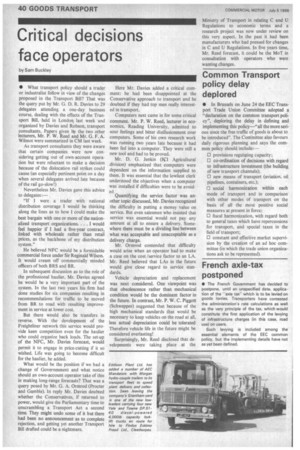Critical decisions face operators
Page 42

If you've noticed an error in this article please click here to report it so we can fix it.
by Sam Buckley • What transport policy should a trader or industralist follow in view of the changes proposed in the Transport Bill? That was the query put by Mr. G. D. R. Davies to 29 delegates attending a one-day business course, dealing with the effects of the Transport Bill, held in London last week and organized by Davies and Robson, transport consultants. Papers given by the two other lecturers, Mr. P. W. Reed and Mr. G. F. A. Wilmot were summarized in CM last week.
As transport consultants they were aware that certain companies were now considering getting out of own-account operation but were reluctant to make a decision because of the dislocation rail strikes could cause (an especially pertinent point on a day when several delegates arrived late because of the rail go-slow!)
Nevertheless Mr. Davies gave this advice to delegates:—
"If I were a trader with national distribution coverage I would be thinking along the lines as to how I could make the best bargain with one or more of the nationalized transport organizations. . . . I would feel happier if I had a five-year contract, linked with wholesale rather than retail prices, as the backbone of my distribution system."
He believed NFC would be a formidable commercial force under Sir Reginald Wilson. It would cream off commercially minded officers of both BRS and BR.
In subsequent discussion as to the role of the professional haulier, Mr. Davies agreed he would be a very important part of the system. In the last two years his firm had done studies for six companies resulting in recommendations for traffic to be moved from BR to road with resulting improvement in service at lower cost.
But there would also be transfers in reverse. With the development of the Freightliner network this service would provide keen competition even for the haulier who could organize back loads. The set-up of the NFC, Mr. Davies forecast, would permit it to engage in price-cutting if it so wished. Life was going to become difficult for the haulier, he added.
What would be the position if we had a change of Governmment and what notice should an own-account operator take of this in making long-range forecasts? That was a query posed by Mr. G. A. Ormrod (Procter and Gamble). In reply Mr. Davies doubted whether the Conservatives, if returned to power, would give the Parliamentary time to unscrambling a Transport Act a second time. They might undo some of it but there had been no announcement as to complete rejection, and getting yet another Transport Bill drafted could be a nightmare. Here Mr. Davies added a critical comment: he had been disappointed at the Conservative approach to transport and he doubted if they had top men really interested in transport.
Computers next came in for some critical comment. Mr. P. W. Reed, lecturer in economics, Reading University, admitted to sour feelings and bitter disillusionment over computers. Some of his own research work was running two years late because it had been fed into a computer. They were still a new tool and had to be proved.
Mr. D. G. Jenkin (WI Agricultural division) emphasized that computers were dependent on the information supplied to them. It was essential that the lowliest clerk understood the objectives when a computer was installed if difficulties were to be avoided.
Quantifying the service factor was another topic discussed, Mr. Davies recognized the difficulty in putting a money value on service. But even salesmen who insisted that service was essential would not pay any amount at all to ensure a delivery. Somewhere there must be a dividing line between what was acceptable and unacceptable as a delivery charge.
Mr. Ormrod contended that difficulty would arise when an operator had to make a case on the cost /service factor to an LA. Mr. Reed believed that LAs in the future would give close regard to service standards.
Vehicle depreciation and replacement was next considered. One viewpoint was that obsolescence rather than mechanical condition would be the dominant factor in the future. In contrast, Mr. P. W. C. Piggott (Schweppes) suggested that because of the high mechanical standards that would be necessary to keep vehicles on the road at all, less actual depreciation could be tolerated Therefore vehicle life in the future might be considered everlasting!
Surprisingly, Mr. Reed disclosed that developments were taking place at the Ministry of Transport in relating C and U Regulations to economic terms and a research project was now under review on this very aspect. In the past it had been manufacturers who had pressed for changes in C and U Regulations. In five years time, Mr. Reed forecast, it could be the MoT in consultation with operators who were wanting changes.
























































































































































